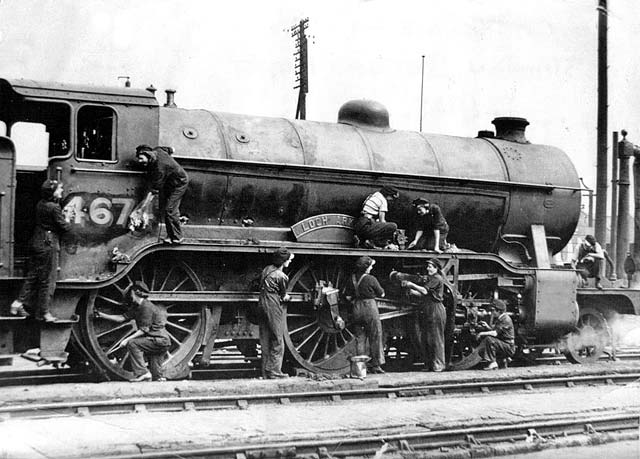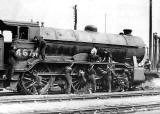|
Recollections St Margaret's Railway Depot Meadowbank, Edinburgh |
1940s
© Reproduced with acknowledgement to Ian Hastie, Coventry, Warwickshire, England Photographer not known
|
Recollections 1 Ian Hastie Coventry, Warwickshire, England |
|
Thank you to Ian Hastie for sending me this photograph. Ian wrote: |
|
Locomotive Cleaners "This photo was taken around the late-1940s. My mother is one of the cleaners in the photo. I don't know the names of any of the others, but maybe somebody else will recognise some of them. My mother, Catherine (Kate) Hastie, is second from the right at the bottom of this photo." Ian Hastie, Coventry, Warwickshire, England: June 28+29 and July 7, 2011 |
|
Who are the Cleaners? If you recognise any of the other cleaners on this photo, please email me and let me know. Thank you. Peter Stubbs, Edinburgh: June 29, 2011 |
|
Reply 1 to Recollections 1 David King Trinity, Edinburgh |
|
Thank you to David King who added: |
|
The Locomotive "What an interesting photo. The engine is number 4674 Loch Arkaig. (One of the cleaners is in front of part of the name.) These engines were LNER Class K2 and were originally built for the Great Northern Railway, having been designed in 1918 by Nigel Gresley. The GNR (which operated between Kings Cross and Doncaster) became part of the LNER in 1923. A number of these engines were transferred to Scotland to be used on the West Highland Line between Glasgow Queen Street and Fort William in 1933, and they were then given suitable names." The Date "Some later ‘migrated’ to the Lowlands, including Edinburgh, where they were mainly used on express goods trains. The date of the photograph may be a little earlier than suggested as the engines were re-numbered (along with all LNER engines) in 1946, this engine becoming number 1764 and, when British Railways was formed in 1948, number 61764. Possibly the picture dates from wartime, when women were employed as cleaners to fill in for men who had been called up to the armed services." David King, Trinity, Edinburgh: June 29, 2011 |

